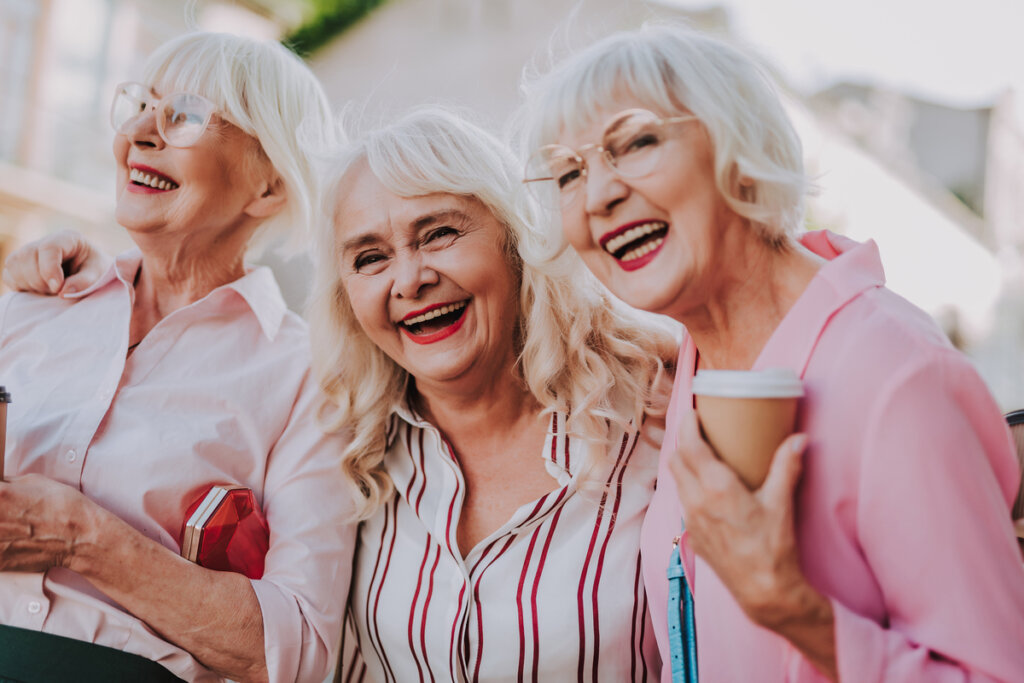Belonging to a Social Group Improves Your Health and Happinesss


Written and verified by the psychologist Valeria Sabater
Belonging to a social group means having an alliance of people to support you. It gives meaning to your days because you carry out different activities together. Activities in which you laugh, learn, and share both your time and your emotions with others. However, in an increasingly individualized and lonely society, it seems that such enriching realities are in danger of extinction.
Just think of children and adolescents, for instance. Many say they feel alone. This is mainly because their dependence on new technologies and social networks isolates them and makes them subject to understanding leisure on a digital, not a real basis. In addition, if they manage to create friendships, they often end up being fluid and not particularly stable. All this means that it doesn’t take long for them to experience feelings of isolation.
They also tend to experience low self-esteem, frustration, and discouragement. That’s because they need to feel that they belong to a group of people. As a matter of fact, it’s essential at any stage of life, not just when we’re young. This is how we learn to live in society. Furthermore, it’s how we discover ourselves and the world around us.
However, current lifestyles seem to be disconnecting us from this basic principle for our happiness.
It’s time to start thinking more about group life. This is how things were with our ancestors, who organized themselves into small social groups.

Belonging to a social group improves your health and happiness
If you’re asked how many friends you have, you might well say “I can count them on the fingers of one hand but I still have more than enough.” It does certainly seem to be the case that it’s extremely common to have two or three solid friendships. These people tend to be enriching figures in every way and genuine companions.
Unfortunately, this tends to neglect something rather important. It’s the fact that, sometimes, by expanding your small circle of friends, you gain greater experiences. These figures don’t have to be as significant as your close friends. However, by including other personalities in your life, you gain different perspectives, knowledge, experiences, and feelings. This is highly positive for your brain.
Let’s take a look at what science has to say on the subject.
Contact with your community increases your well-being
Nottingham Trent University conducted some extremely interesting research in 2017. They studied nearly 4,000 people in order to understand how they related to each other and how this impacted their perception of their happiness. The study found that that the more connected the participants were to their community or social groups, the higher were their levels of well-being.
Therefore, it would seem that expanding your circle a little more, as opposed to only spending time with family or close friends, could prove to be pretty important. For example, the simple act of playing sports with other people, joining a dance class, and participating in community or leisure events could improve your levels of satisfaction, health, and happiness.
You can’t ignore the fact that, as humans, we’re all social beings. Also, that we’re the result of our evolution and that our ancestors interacted with each other in small social groups. Indeed, the feeling of belonging not only gives you roots and a psycho-emotional substrate but also allows you to feel useful. Furthermore, it makes it easier to share experiences with more people from whom you can learn.
Your psychological health improves when you identify and share time with a social group. You recover your purpose, the will to live, and your motivation.
Belong to a social group, create your own tribe
There are many studies in the fields of sociology, anthropology, and psychology concerning the benefits of belonging to a social group. For example, research conducted by the University of Queensland highlighted something important in this regard. It was the fact that, in reality, it’s not enough simply to have contact with a community in order to experience satisfaction.
As a matter of fact, these interaction dynamics only protect your health and well-being when you identify with your social group. In other words, the feelings of belonging originate when you share the same values, interests, passions, and life purposes with others in your group.
Metaphorically, this means building your own tribe. One in which figures are included with whom you identify, who support you, interest you, and laugh and cry with you. They’re social alliances that are based on empathy, common passions, and a genuine interest in each other.

Connection versus individualization
It’s high time we reflected upon the current individualization process that’s so common in the way we’re socially organized. This is a common occurrence in daily life. We should also think about older people. Because isolation increases feelings of hopelessness and worsens health. In fact, we should start favoring the kind of mechanisms that mean different population groups have greater connections with each other.
For example, organizing dynamics at the community level would be a good way to start. We can facilitate those much-needed meetings for people to socialize and create new connections. Like our adolescents, we must establish mechanisms in order to find new figures with whom we share passions, activities, goals, and future projects.
Belonging to a social group provides an incentive for your mind, breath for your body, and a tribe to turn to in both good times and bad.
Belonging to a social group means having an alliance of people to support you. It gives meaning to your days because you carry out different activities together. Activities in which you laugh, learn, and share both your time and your emotions with others. However, in an increasingly individualized and lonely society, it seems that such enriching realities are in danger of extinction.
Just think of children and adolescents, for instance. Many say they feel alone. This is mainly because their dependence on new technologies and social networks isolates them and makes them subject to understanding leisure on a digital, not a real basis. In addition, if they manage to create friendships, they often end up being fluid and not particularly stable. All this means that it doesn’t take long for them to experience feelings of isolation.
They also tend to experience low self-esteem, frustration, and discouragement. That’s because they need to feel that they belong to a group of people. As a matter of fact, it’s essential at any stage of life, not just when we’re young. This is how we learn to live in society. Furthermore, it’s how we discover ourselves and the world around us.
However, current lifestyles seem to be disconnecting us from this basic principle for our happiness.
It’s time to start thinking more about group life. This is how things were with our ancestors, who organized themselves into small social groups.

Belonging to a social group improves your health and happiness
If you’re asked how many friends you have, you might well say “I can count them on the fingers of one hand but I still have more than enough.” It does certainly seem to be the case that it’s extremely common to have two or three solid friendships. These people tend to be enriching figures in every way and genuine companions.
Unfortunately, this tends to neglect something rather important. It’s the fact that, sometimes, by expanding your small circle of friends, you gain greater experiences. These figures don’t have to be as significant as your close friends. However, by including other personalities in your life, you gain different perspectives, knowledge, experiences, and feelings. This is highly positive for your brain.
Let’s take a look at what science has to say on the subject.
Contact with your community increases your well-being
Nottingham Trent University conducted some extremely interesting research in 2017. They studied nearly 4,000 people in order to understand how they related to each other and how this impacted their perception of their happiness. The study found that that the more connected the participants were to their community or social groups, the higher were their levels of well-being.
Therefore, it would seem that expanding your circle a little more, as opposed to only spending time with family or close friends, could prove to be pretty important. For example, the simple act of playing sports with other people, joining a dance class, and participating in community or leisure events could improve your levels of satisfaction, health, and happiness.
You can’t ignore the fact that, as humans, we’re all social beings. Also, that we’re the result of our evolution and that our ancestors interacted with each other in small social groups. Indeed, the feeling of belonging not only gives you roots and a psycho-emotional substrate but also allows you to feel useful. Furthermore, it makes it easier to share experiences with more people from whom you can learn.
Your psychological health improves when you identify and share time with a social group. You recover your purpose, the will to live, and your motivation.
Belong to a social group, create your own tribe
There are many studies in the fields of sociology, anthropology, and psychology concerning the benefits of belonging to a social group. For example, research conducted by the University of Queensland highlighted something important in this regard. It was the fact that, in reality, it’s not enough simply to have contact with a community in order to experience satisfaction.
As a matter of fact, these interaction dynamics only protect your health and well-being when you identify with your social group. In other words, the feelings of belonging originate when you share the same values, interests, passions, and life purposes with others in your group.
Metaphorically, this means building your own tribe. One in which figures are included with whom you identify, who support you, interest you, and laugh and cry with you. They’re social alliances that are based on empathy, common passions, and a genuine interest in each other.

Connection versus individualization
It’s high time we reflected upon the current individualization process that’s so common in the way we’re socially organized. This is a common occurrence in daily life. We should also think about older people. Because isolation increases feelings of hopelessness and worsens health. In fact, we should start favoring the kind of mechanisms that mean different population groups have greater connections with each other.
For example, organizing dynamics at the community level would be a good way to start. We can facilitate those much-needed meetings for people to socialize and create new connections. Like our adolescents, we must establish mechanisms in order to find new figures with whom we share passions, activities, goals, and future projects.
Belonging to a social group provides an incentive for your mind, breath for your body, and a tribe to turn to in both good times and bad.
All cited sources were thoroughly reviewed by our team to ensure their quality, reliability, currency, and validity. The bibliography of this article was considered reliable and of academic or scientific accuracy.
- Jetten, Jolanda & Haslam, Catherine & Haslam, S. & Dingle, Genevieve & Jones, Janelle. (2014). How Groups Affect Our Health and Well-Being: The Path from Theory to Policy. Social Issues and Policy Review. 8. 128. 10.1111/sipr.12003.
- Wakefield, J.R.H., Sani, F., Madhok, V. et al. The Relationship Between Group Identification and Satisfaction with Life in a Cross-Cultural Community Sample. J Happiness Stud 18, 785–807 (2017). https://doi.org/10.1007/s10902-016-9735-z
This text is provided for informational purposes only and does not replace consultation with a professional. If in doubt, consult your specialist.







